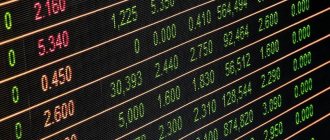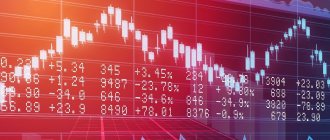After the coronavirus epidemic, many people are thinking about alternative options for earning money. Employment turned out to be not as reliable as we would like, and in order to maintain a decent standard of living, we need to look for other financial opportunities. Trading and investing turned out to be one of the alternatives to hired labor. What kind of income is this and why does it attract people so much? In this article, I will analyze the main aspects of the work of a trader and an investor, as well as the difference between these two jobs. I'll look at some myths about trading and investing that can be confusing and give false hope, as well as some tips for beginners. Let's start with the basics.
How long does it take to learn how to make money on the stock exchange?
The minimum period is six months. During this time, you can gain experience and identify the basic mechanisms of the exchange. But in order to learn how to maneuver deftly, you need to be patient and count on a longer period. At least for several years.
It is impossible to name the exact time period after which a beginner becomes a pro. There is no need to rest on your laurels and consider yourself a guru. Everyone needs to constantly grow and improve. Because working methods and technologies are changing at warp speed.
Who is a trader and how does he work?
A trader is a person who makes money by speculating on assets on the stock exchange. A little higher you have already read about the features of trading. The basis of the strategy is to profit from the price difference. Buy cheaper, sell more expensive, and vice versa. It sounds quite simple, but in practice this activity requires a huge amount of knowledge, analytical thinking and many other important qualities. Unfortunately (or fortunately), not everyone can become a trader, let alone a successful one.
It is not so important for a trader to know what will happen to the company in a year or more. For him, short-term price fluctuations are much more important. Many traders day trade, which means they buy and sell an asset within the same trading day. For such trading, technical analysis methods are usually used. These methods help to find a pattern in price movement and predict its further movement. Theoretically, a trader can trade without even knowing the name of the company or the industry in which it operates - all the information he needs is contained in the history of price fluctuations.
Necessary qualities for trading
Trading is working for yourself, so self-discipline is extremely important here. But this is not the only important quality for a trader. You will also need:
- Stress resistance. Trading on the stock exchange involves a high level of stress, which many beginners simply cannot stand.
- Coolness. If a trader starts to panic and change strategy at the slightest price fluctuations that are not according to the forecast, he will not succeed on the stock exchange.
- Adaptability. On the other hand, stubbornly trading with a strategy that has shown its failure is not much better. You need to be able to admit your mistakes in time and change your trading tactics.
- Learning ability. In trading you have to learn constantly. Even traders with 10+ years of experience continue to improve their skills, learn important data about industries and production features, and get acquainted with new economic trends. I'm not even talking about the huge amount of information that you need to master in order to start working on the stock exchange. If you are not ready to learn throughout your life, it is better to give up trading right now.
- Ability to analyze. The key task of a trader is to determine the further movement of the asset price. If you are not capable of this, then there can be no talk of any success.
How much can a trader earn?
Imagine that you, as a trader, predicted a rise in prices for Gazprom shares - now they cost 90 rubles, and in a week they should cost about 95 rubles. If you have 9,000 rubles in your brokerage account, then you can buy a maximum of 100 shares. In a favorable case (if your forecast turns out to be correct), by waiting for the price to rise and selling the shares, you will receive a profit in the amount of 5 * 100 = 500 rubles. But if you have not 9, but 90 thousand in your account? The possible profit also increases - you can buy 10 times more shares, and the income will increase proportionally to 5,000 rubles.
In practice, a trader never invests all his capital in one asset. But I’m giving a simplified example so that beginners can understand more clearly what a trader’s earnings depend on.
The amount of a trader’s earnings depends primarily on the size of his capital. If you have the opportunity to trade 100 thousand rubles, then your potential income will be significantly higher than that of a trader with 10 thousand in his pocket. Please note that I write “income potential” because in reality, having a lot of capital does not guarantee financial success. If you develop the wrong strategy and persist in making trading mistakes, a high number in your brokerage account will not help you.
A trader’s profitability can vary from 20 to 80% per annum. It depends on many factors:
- forecast accuracy;
- psychological preparation (in trading, composure and the ability to cope with stress play a very important role);
- force majeure (sometimes even the best strategy can stumble due to some kind of force majeure that destroys the economy of an entire industry);
- ability to adapt;
- analytical skills and so on.
Neither I nor any other mentor can tell you exactly how much profit you will get from trading with your capital. And the huge spread of profits among millions of traders does not allow us to collect accurate statistics. There is no ceiling - but there is also no minimum. Beginners often make a profit of about 1000 rubles per month, if not less. The largest traders manage to make billions of dollars from trading.
Many beginners are interested in the question of whether a trader’s earnings are comparable to the average salary. The answer is yes, with due diligence you can receive an equivalent to the median salary, and much larger amounts from trading. But don’t rush to quit your job if you are planning to devote yourself to trading on the stock exchange. First of all, you can't be sure you'll like it until you try it. Secondly, to start making decent profits from trading, you will need experience and time.
Here are some tips for new traders:
- Don't expect serious profits in the first few months. 10 thousand rubles is already very good for a beginner.
- Don't put all your capital into a brokerage account at once. By wanting to multiply your profits in this way, you risk losing your entire fortune instead.
- Avoid mentors and coaches who promise 100 thousand or more income in the first six months of trading. This simply doesn’t happen, and the “teacher” just wants to cash in on your gullibility.











